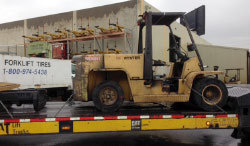What to Do with a Forklift at its End-of-Life
Last month, we discussed how to tell if you have a forklift which has reached the end of the line. (If you missed it, check Signs a Forklift is Ready for Retirement before reading this post.)
However, when it's time, there's another issue: HOW do you retire a forklift?
A forklift is a huge, intricate piece of machinery. It contains parts potentially hazardous to the environment (lubricants, batteries). And there’s a lot of recyclable metal inside them. You can't just park it next to a dumpster and walk away.
So what should you do with a forklift at its end-of-life? Easy. Recycle it!
How to Recycle an Old Forklift
Step 1: Call your local Cromer (see the footer below for your nearest location and its phone number).
Step 2: Tell us the make and model of the forklift you want picked up.
Step 3: Done.
It's that easy. Cromer takes care of end-of-life forklifts all the time. This is what we do with your old trucks when recycling:
- A Cromer technician picks up the retired forklift. We do not charge for these pickups.
- We bring the forklift back to our nearest facility (California or Nevada).
- Once there, we start the recycling process by draining all the oils & hazardous materials.
- Next, we remove any extraneous parts. This includes the batteries, if it’s an electric truck.
- We wash the forklift thoroughly to clear out debris and any remaining fluids.
- Following the wash, we completely dismantle the forklift, piece by piece, converting it into a collection of loose/scrap metal.
- We send the metal off to an industrial recycler for melting down. 100% of the metal is recycled.
- We either recycle all hazardous materials, or dispose of them safely.

This process does cost us, both in time and fees. That's okay though...we perform the service because it’s necessary. You, our customers, need a safe & reliable place to send your retired forklifts. The result is more material available to build electronics, vehicles, even more forklifts. That’s why we do it.
Why Recycling is the Best Option for End-of-Life Forklifts
Why recycle forklifts at all? We have several reasons, and we think you'll agree with them:
- It's the responsible choice. Recycling ensures the components don't go to waste. They’re either recycled into new steel, or re-used in other material handling equipment.
- Environmentally Friendly. When Cromer processes old forklifts, we recycle the whole thing. 100% of it. This prevent dangerous materials like battery acid or hydraulic oil from leaching into the ground, or polluting the air. With everything properly disposed of, the forklift presents zero risk to the environment, and we've done some good for our planet.
- Zero Liability. Cromer Material Handling does not recommend selling an old forklift if it’s ready for retirement. You could risk liability if the forklift causes property damage or injury to a worker—even if the forklift is no longer at your facility!
Now you know how to tell if a forklift is ready for retirement, and what to do with it when that time comes. Cromer is happy to provide new replacement trucks...and to take care of the old one for you. Keep it in mind for those forklifts which keep needing maintenance over and over.
UPDATED APRIL 2021


